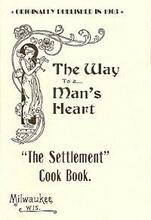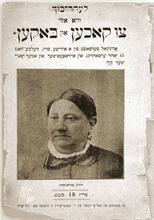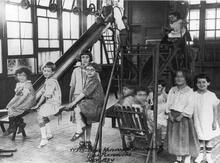Lizzie Black Kander
Courtesy of the Wisconsin Historical Society.
Lizzie Black Kander turned the recipe book she made for a cooking class for new immigrants into a two-million-copy bestseller. Kander founded the Milwaukee Jewish Mission, called “the Settlement,” in 1896 as a base for vocational training, education, and entertainment for the poor and for new immigrants, serving as president for two decades. In 1901, denied the funds she needed to print recipes for a cooking class, Kander got funding from local businesses and printed a thousand copies of The Settlement Cook Book: The Way to a Man’s Heart, selling the extra copies off for fifty cents each. The book went through twenty-three editions, and Kander used the profits to fund two new community centers. In 1939, Wisconsin honored her as one of the state’s outstanding women.
“The way to a man’s heart is through his stomach.” In 1901, Lizzie Kander and Mrs. Henry Schoenfeld used this adage in the title of a cookbook produced for the benefit of the first settlement house in Milwaukee, Wisconsin. By 1984, nearly two million copies of The Settlement Cook Book: The Way to a Man’s Heart had been sold. Its success can be attributed to the determination and ingenuity of a woman known as the “Jane Addams of Milwaukee.”
Early Life and Service
Lizzie Black Kander, born in Milwaukee on May 28, 1858, was the third of John and Mary (Pereles) Black’s five children. Siblings included Annie Wetzler, Flora Gottachalk, and Herman, a newspaper publisher. She graduated in 1878 from Milwaukee High School and married Simon Kander, a salesman from Baltimore, on May 17, 1881. They were married for fifty years.
Kander began her service to the Jewish community in 1878 as a volunteer in the Ladies Relief Sewing Society, an organization that evolved into the Milwaukee Jewish Mission formed in 1896 under her leadership. As president of “The Settlement” (1900–1918), Kander took a pragmatic and practical approach to problems and programs. In one project, excess steam from a local brewery was used to heat water for community bathing facilities. Along with other volunteers, Kander developed popular cooking classes for young immigrants and supervised educational, social, and recreational programs for neighborhood residents.
In 1901, the Settlement’s board denied Kander’s request to underwrite the cost of printing recipe booklets for her classes. Undaunted, Kander approached the Milwaukee business community, secured outside funding, and had one thousand copies printed. Excess copies were sold through a local department store for fifty cents each. An expanded 1903 edition, supported by sixty-five local sponsors, included 180 pages of household hints, kitchen-tested recipes, and reliable instructions for preparing traditional and German Jewish foods. Kander became head of the Settlement Cook Book Company in 1914 and subsequently supervised the publication of twenty-three editions. Profits from this successful business venture funded newer and larger facilities, the Abraham Lincoln House, built in 1911, and the Jewish Community Center, opened in 1931.
Career and Legacy
Kander utilized her leadership skills in a voluntary association and carved out a unique career as a female activist and entrepreneur. She identified issues, devised creative strategies, and sought out alternative funding solutions in order to shape and support a vital community institution. The Settlement Cook Book tapped into and capitalized on emerging local services and pioneering national trends: the organization and development of settlement houses, the interests of American women in nutritious meal planning and scientific home management, and the growth of autonomous funding mechanisms for nonprofit charitable associations.
Kander was an advocate of vocational education for women. She served on the Milwaukee school board from 1907 to 1919, helping to establish the Girls Technical High School as well as the nursery school at Milwaukee Teachers College. In 1939, Wisconsin honored Kander as one of the state’s outstanding women. She belonged to the Social Science Club, the National Council of Jewish Women, the Southside Women’s Club, and Congregation Emanuel B’ne Jeshurun. She died at age eighty-two on July 24, 1940.
Crocker, Ruth Hutchinson. Social Work and Social Order: The Settlement Movement in Two Industrial Cities, 1889–1930 (1992).
Obituary. NYTimes, July 26, 1940, 17:6.
NAW; Scott, Anne Firor. Natural Allies: Women’s Associations in American History (1991).
Trolander, Judith A. Professionalism and Social Change: From the Settlement House Movement to Neighborhood Centers, 1886 to the Present (1987).






